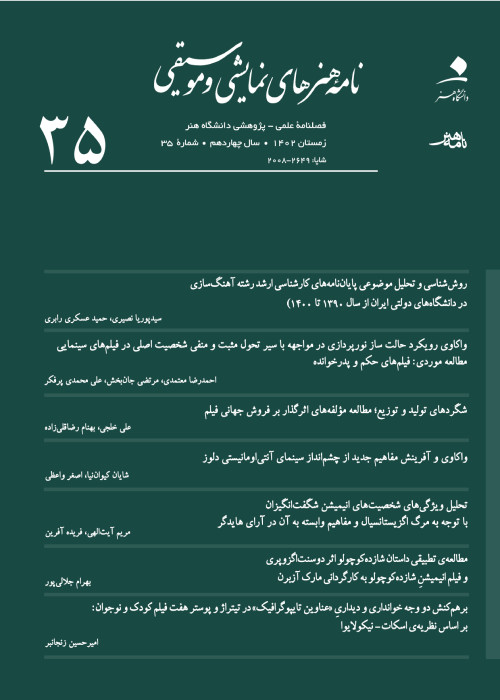Diegesis vs. Mimesis; The Analysis of Narrative Aspects in Selected Works by Bahram Beyzai
Article Type:
Research/Original Article (دارای رتبه معتبر)
Abstract:
The concept of diegesis (telling or recounting a story) originally appeared in Platos thesis as opposed to mimesis (showing or enacting a story). In the current era, the notions of diegesis and mimesis, developed as key elements for differentiating verbal narratives from drama, have been reconsidered by narratologists who argue that in a play, an actor presents the sequence of events that is generally mediated through a given narrator in a fiction. In Stage Fright: Modernism, Anti Theatricality, and Drama (2002), Marin Puchner coined the term digetic theatre. Digetic theatre focuses on a type of theatre that uses narrative and discourse techniques to deviate the audiences attention from actors performance to words. Puchner uses this term to illustrate descriptive and narrative solutions that have played notable roles in confining, leading, and neutralizing direct theatricality of stage and actors in modern drama. In Iranian drama Beyzai, Influenced by his knowledge of Taziyeh, tried to reshape local plays and turn them into stage drama for which he benefitted from Persian storytelling traditions. His main concern was to establish Persian drama on the local traditions. Starting his theatrical activities, he attempted to maintain the fine literature of epic poetry by relying on poetic and elevated discourse. The present study explores the process of diegetic language as the pivotal discourse of Naghali and Taziyehs turning into the Beyzais works. The diegetic and story features of his works will be analyzed by elements such as narrative intermediators, character, action, and setting and their evolution. This study exemines that Beyzais early works, it means Se Barkhani (Three Recounting), have story and diegetic nature by following elements such as narrative intermediator, character, action, and place/space. With these features, these works cannot rightly be considered to be plays, and the title the writer himself has chosen for his works as Barkhani (recounting) is obviously an indicator of this nature. On the one hand, these works reflect the rhythm and richness of the epic poetry in the form of prose, and on the other hand they represent the storytelling of the oral tradition of Naghghali in written form as drama. In Soltan Maar (Serpant the King), he returns to a story atmosphere in which time and place/space easily change, characters change their roles, and whenever actors find it difficult to perform an action they simply present it to the audience in words. Finally, Khaterat-e Honarpishe-ye Naghsh-e Dovvom (Memoirs of the Actor in a Supporting Role) can be classified under digetic theatre. Mimesis and imitation are not neglected in these works, and action, sound, and image are not marginalized from the text for the sake of dialogue- as it is with closet drama. On the contrary, this play is good example that indicates the presence of all the visual and mimetic elements in digetic form. In other words, in the battle between imitating and telling, telling is dominant.
Keywords:
Diegetic Theatre , Beyzai , Diegesis , Mimesis , Narratology
Language:
Persian
Published:
Journal of dramatic Arts and Music, Volume:8 Issue: 16, 2018
Pages:
37 to 53
magiran.com/p1879141
دانلود و مطالعه متن این مقاله با یکی از روشهای زیر امکان پذیر است:
اشتراک شخصی
با عضویت و پرداخت آنلاین حق اشتراک یکساله به مبلغ 1,390,000ريال میتوانید 70 عنوان مطلب دانلود کنید!
اشتراک سازمانی
به کتابخانه دانشگاه یا محل کار خود پیشنهاد کنید تا اشتراک سازمانی این پایگاه را برای دسترسی نامحدود همه کاربران به متن مطالب تهیه نمایند!
توجه!
- حق عضویت دریافتی صرف حمایت از نشریات عضو و نگهداری، تکمیل و توسعه مگیران میشود.
- پرداخت حق اشتراک و دانلود مقالات اجازه بازنشر آن در سایر رسانههای چاپی و دیجیتال را به کاربر نمیدهد.
In order to view content subscription is required
Personal subscription
Subscribe magiran.com for 70 € euros via PayPal and download 70 articles during a year.
Organization subscription
Please contact us to subscribe your university or library for unlimited access!



